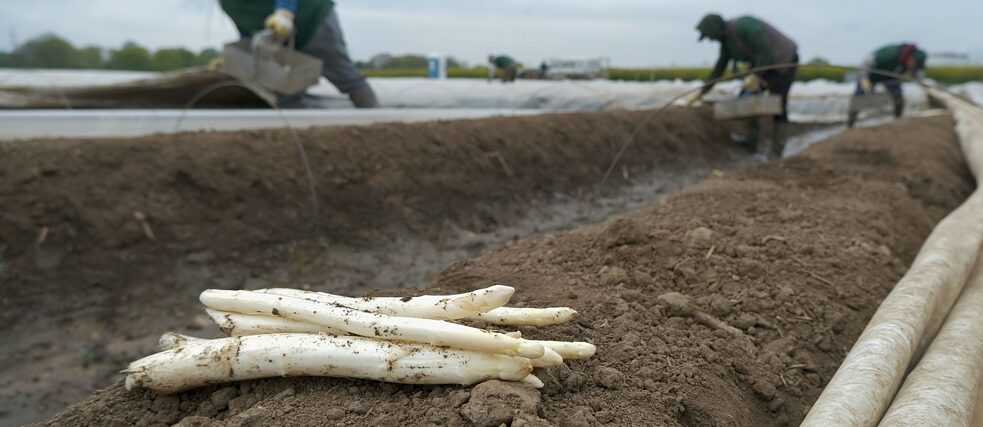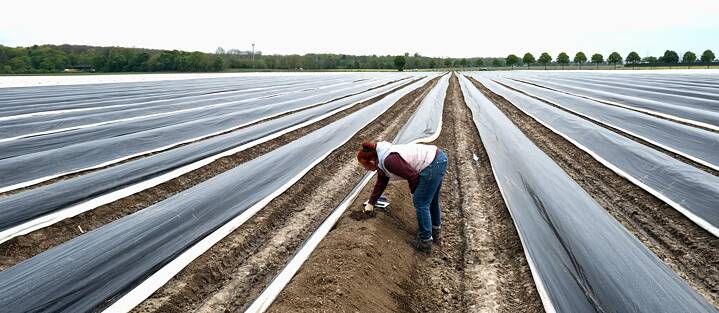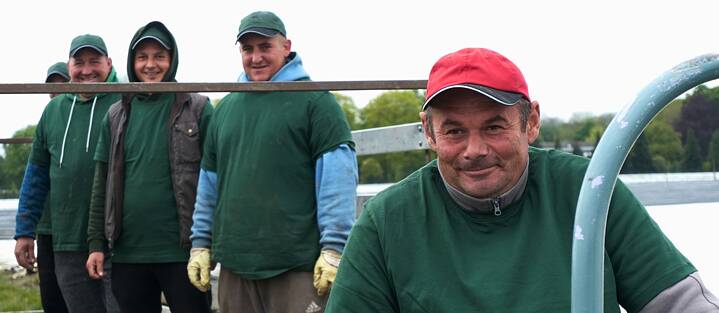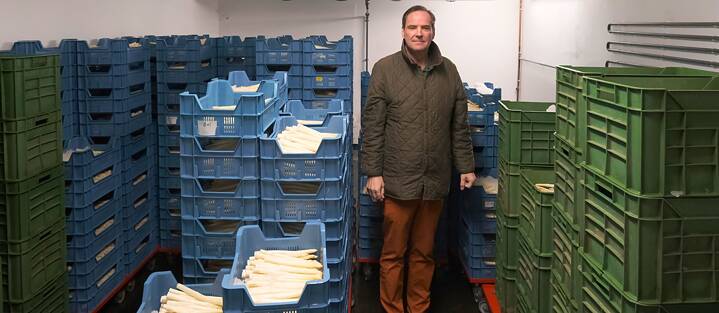From farm to plate
Germany’s white gold

Spring in Germany is almost synonymous with blooming fields of white asparagus. But what is the fascination with this “white gold”? Our author explores this intrigue through a farm visit in Cologne and discovers a heartwarming love story from the 16th century.
By Saurabh Narang
Imagine a partly cloudy day with birds singing all around. You are in the middle of a muddy German farm. Rows of knee-high, grey-brown hills of dirt surround you. Armed with a trowel and cutter, Germany's "white gold" - asparagus - awaits your harvest.
What is white asparagus?
White asparagus, called "Spargel" in Germany, is eagerly awaited each spring. It's grown underground to prevent sunlight from reaching it, which keeps it white and tender. The harvesting season known as "Spargelzeit" runs from mid-April until the official end on June 24, the Feast Day of St. John the Baptist. During this time, white asparagus is celebrated in restaurants and homes across the country. It's often served boiled with butter or hollandaise sauce, alongside ham and potatoes. From asparagus roads to asparagus queens, this "vegetable of kings" even boasts its own museum in Schrobenhausen, Bavaria.Asparagus farm visit

Sabine Abd Elrahiem demonstrates the harvesting process of white asparagus in Cologne, North Rhine-Westphalia. | Photo (detail): Saurabh Narang
It was then my turn to dig for white asparagus. Ms. Abd Elrahiem pointed to the ground and instructed me to dig there. I followed her instructions closely and mastered holding a perfect, 22-centimetre asparagus spear in under a minute! Hubertus von Groote, owner of Beller Hof, came over to cheer. "Your first asparagus! Hooray!" he boomed.

Workers from Eastern Europe assist with asparagus harvesting. | Photo (detail): Saurabh Narang
Meet the asparagus farmer

Hubertus von Groote inside the production unit at Beller Hof in Cologne, North Rhine-Westphalia. | Photo (detail): Saurabh Narang
Mr. von Groote, can you tell us a little about your family history?
My family goes back to the 16th century. During the Reformation, my ancestors faced religious conflict and fled to Cologne to preserve their Catholic faith. My great great great great great grandfather told his wife to take the children and go to Cologne. Remarkably, after a long separation, they were reunited through a stroke of luck as one evening he heard his wife's familiar piano melody while wandering the streets of Cologne!
How did your family come to be asparagus farmers?
I joined the farm in 1998 and took over in 2004, following in my father's footsteps, who started it in 1970. My father started with asparagus in 1991. Back then, many doubted and even laughed at us – asparagus farming wasn't common in our region, and we lacked the ideal sandy soil. But thanks to German technology and sheer determination, we've thrived for over 30 years in the asparagus business.
What defines high-quality asparagus for you?
Ultimately, the decision lies with the customer. But as a producer, I know the challenges of keeping white asparagus white – it requires complete darkness. Sunlight turns the tips pink, then red, and eventually green, indicating age and less freshness. Fresh asparagus has a distinct snap when rubbed together and releases water when cut.
Do you have any interesting asparagus-related stories?
We've noticed that asparagus shoots appear around six weeks after the geese (migratory birds) arrive. Sometimes, new customers after hearing positive reviews, buy our asparagus but come to return it later, claiming it's too hard to eat even after cooking for a long time. The surprising twist? When we inquire further, we discover they haven't peeled the asparagus before cooking!
Why is white asparagus called "white gold" in Germany?
It's more than taste! White asparagus is expensive because it's a year-round commitment for a short, 2-3 month harvest. The meticulous process requires constant attention – from precise temperature and moisture control to battling unpredictable weather. Rain makes the fields too muddy for tractors, potentially damaging the soil for years to come. For example, 2024 has been the most challenging year I've faced in my entire farming career, mainly due to the unpredictable weather. In January, with my mother in the hospital, I only had a three-day window to get the tractor out and cover my entire 29 hectares of farmland. This meant working overtime, day and night, to protect the crops. So, the high price tag reflects the hard work, the unpredictable climate, and the limited window we have to grow this "white gold."
What does the future hold for your farm?
While I don't have children yet, my sister's son, Leo, shows a real passion for agriculture and is always happy to lend a hand on the farm. I hope that one day, I can pass this legacy down to my own kids (should I have any), continuing the von Groote asparagus story for generations to come.
A Delicious Ending

Spargelcremesuppe (German White Asparagus Cream Soup). | Photo (detail): Saurabh Narang
PS: Beller Hof has a dedicated page for asparagus recipes for anyone who wants to try German asparagus.
(Note: This interview has been edited for clarity and to keep the story concise.)